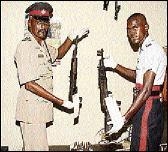
Photo by Noel Thompson
Inspector Louis Brown (left), head of the Black River Police Station, and Constable Paul Smith display two AK-47 rifles, which were seized in a shoot-out in St Elizabeth.
Noel Thompson, Gleaner Writer
WESTERN BUREAU:
After a worrying flare-up of crime in sections of St Elizabeth early this year, the police in the parish are expressing confidence that recent measures have started to bear fruit.
In fact, the parish recorded only one murder last month, with most other major crimes recording declines when compared with July 2008.
Since the start of this year, 15 persons have been murdered in the parish, down from 18 in the corresponding period last year.
"We started a rigorous ganja eradication in the parish to stem the flow of illegal guns into the community and the transporting of guns out of the community," a senior police officer told The Sunday Gleaner as he sought to explain the positive trend.
Improved relationship
The senior officer said improved relationships between residents and the police is also one of the reasons for the reduction of crime in the parish.
Crime in St Elizabeth hit the national radar earlier this year, with two criminal gangs operating out of Lacovia and the drugs-for-guns trade being blamed for the upsurge.
It was also feared that St Elizabeth gang members were contracting Kingston-based gunmen to carry out killings in the parish.
A senior police officer in the parish, who spoke on condition of anonymity, said the crime problem started a few years ago when some farmers in the Lacovia area travelled to Kingston to sell peanuts.
"On one occasion, some of them brought small portions of marijuana and within minutes the ganja sold off. The word spread among farmers and they started transporting larger portions of weed disguised in their peanuts daily into Kingston," the cop said.
Soon after, problems started when they were told they had to pay protection money to a Corporate Area strongman.
Some of the St Elizabeth men developed a strong link with the gangster and this gave birth to the first major criminal gang in the parish.
Gang split
Two of the farmers were subsequently murdered and their bodies found burnt. Eventually, the gang split and a feud developed in St Elizabeth with Corporate Area gangsters figuring prominently in the shootings.
This resulted in the recent murder of four men believed linked to the gangs.
They have been identified as 35-year-old Owen Tapper of Greenwich Town, Kingston 13; Ricardo Wyne, 26, Denroy Knight and Omar Francis.
On August 10, Wyne was murdered in the Holland Bamboo area.
Three days later, Knight was shot dead metres from where Wyne, his cousin, had been killed. It is alleged that they were aligned to opposing gangs operating in and around Lacovia.
On April 24, Tapper, who it is alleged had gone to Lacovia to retrieve illegal guns, was murdered. While he was being buried on May 17, Francis was shot. In retaliation, Kimani Smith was shot and injured on May 18.
Attacking family homes
On May 24, gang members shot up the house owned by one of their opponent's grandmother in Dry Harbour, Lacovia.
Romeo McKenzie was accused of being involved in that incident and was murdered in Kingston four days later.
In an effort to contain crime and to dismantle the gangs, the police raided some hot spots in the Lacovia which resulted in a lull in the criminal activities.
Last Friday, the police reported that nine men engaged them in a lengthy gun battle in Lacovia.
Three of the alleged gunmen were shot dead. They were later identified as Alrick Green, alias 'Baller' and 'Bun Up', 35, of Dry Harbour; Mark Thompson, 18, of Cuffes Pen and Kiron Lindsay, 26, of Towarie Crescent, Kingston 13. The others escaped.
"We believe the most ganja is cultivated in St Elizabeth, which contributes significantly to the recent upsurge in crime, but we have implemented strategies to locate and eradicate the weed fields, arrest persons and to confiscate the illegal weapons," said the senior officer.
However, one resident told The Sunday Gleaner that a drop in ganja sales has forced some persons into crime.
Roadblocks
"The weed nah sell because police having regular roadblocks. People have no other way of living," the resident said.
"Di dealers dem fraid fi get ketch and di police dem fraid fi collect money because dem nuh waan get bus. One time yuh could a give a police a money and go through, but now dem nah dweet because dem don't know if you ago inform pon dem," the resident said.
According to the resident, ganja farmers are now looking at creative ways to get their weed to buyers.
"Weed can't leave by sea again because coastguards lock off that channel. People losing money because of that. Anywhere yuh hear bout a shooting, yuh know it have something fi do wid drugs."
"Peanut farming is getting a blow because the price is unstable, so a lot of people have resorted to cultivating ganja because it takes less work and it is ready for reaping within two months," another farmer said.
But the police in the parish are not buying that excuse and have vowed to take measures to stamp out ganja farming while targeting the criminals operating in the parish.